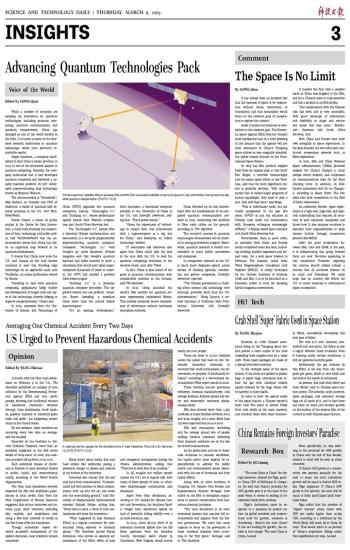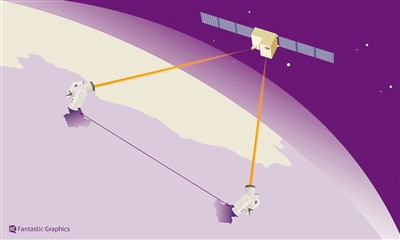
 |
| China's quantum satellite Micius achieves the world's first successful satellite-to-ground quantum key distribution and ground-to-satellite quantum teleportation. (PHOTO: VCG) |
While a number of countries are ramping up innovation on quantum technologies, including quantum computing, quantum communication and quantum measurement, China has emerged as one of the world leaders in the field. It is home to some of the foremost research institutions in quantum technology, which have produced remarkable results.
Origin Quantum, a company established in East China's Anhui province in 2017, is one of the prominent players in quantum computing. Recently, the company announced that it had developed quantum computers and delivered a 24-qubit machine powered by self -developed superconducting chip technology, known as Benyuan Wuyuan.
The announcement is "formidable", Skip Sanzeri, co -founder and COO of QuSecure, a maker of quantum-safe security solutions in the U.S., told TechNewsWorld.
Hodan Omaar, a senior AI policy analyst at the Center for Data Innovation, a think tank studying the intersection of data, technology, and public policy, told TechNewsWorld that the announcement shows that China has taken an important step forward in its quantum development.
It means that China now joins the U.S. and Canada as the only known countries to have this bleeding-edge technology on an applicable scale, said TechRadar, an online publication owned by Future.
"Investing in near-term quantum computing applications helps bolster the development of longer-term use cases of the technology, thereby helping to improve competitiveness," Omaar said.
In 2021, scientists from the University of Science and Technology of China (USTC) upgraded two quantum computers, namely, "Zuchongzhi 2.1" and "Jiuzhang 2.0", whose performance speeds exceed their Western competitors, said South China Morning Post.
The "Zuchongzhi 2.1", named after a historical Chinese mathematician and astronomer, is a 66-qubit programmable superconducting quantum computer. Compared "Zuchongzhi 2.1" with Google's 55 -qubit Sycamore, Fortune magazine said that Google's quantum machine had taken minutes to solve a calculation that would have taken supercomputers thousands of years to unravel, but USTC had cracked a problem three times tougher.
"Jiuzhang 2.0" is a photonic quantum computer prototype. The upgraded-version one can perform Gaussian Boson Sampling a septillion times faster than the current fastest supercomputer.
"It's an exciting development," Scott Aaronson, a theoretical computer scientist at the University of Texas in the U.S., told Scientific American, adding that, "That's pretty insane."
"Given the importance of technology in today's time, this achievement with a supercomputer is a big win for China," said Fossbytes, an Indian technology website.
IT columnists and observers also agree that China could take the lead in the race with the U.S. to lead the quantum computing revolution in the decades ahead, said Asia Times.
In fact, China is also ahead of the game in quantum communication, with considerable victories in the domain, said The Diplomat.
In 2016, China launched the world's first satellite for quantum science experiments, nicknamed Micius. This enables extremely secure transmission of information without traditional encryption methods.
China followed up on this achievement with the establishment of an integrated quantum communication network in 2019, connecting two satellites to fiber optic cables on the ground, according to The Diplomat.
The country's success in quantum technologies advancement can be credited to strong government support. Meanwhile, quantum research is mostly concentrated in some public universities and companies.
In comparison, research in the U.S. is much more disparate-spread across dozens of funding agencies, universities and private companies, Scientific American reported.
"The Chinese government is thinking about science and technology very seriously, probably more than the U.S. administration," Wang Zuoyue, a science historian at California State Polytechnic University told Scientific American.


 Next
Next




